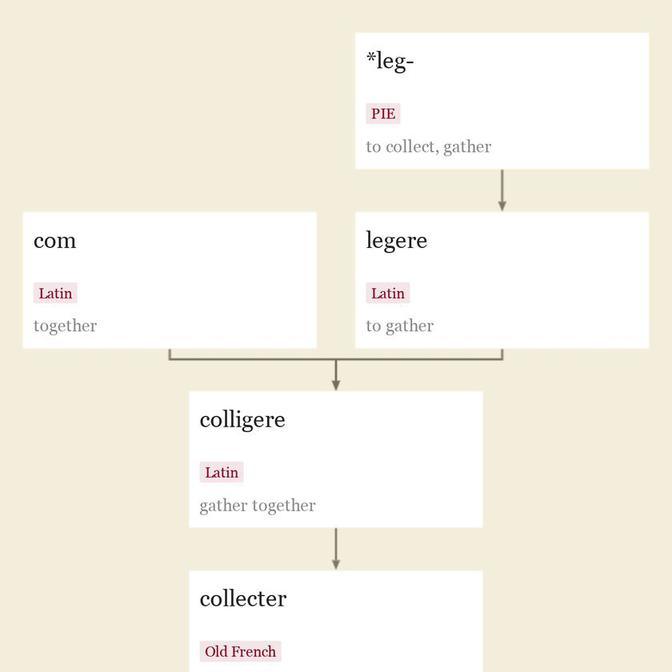recollection (n.)
1590年代,“再次聚集”,源自法语 récollection(14世纪)或直接源自中世纪拉丁语 recollectionem(主格 recollectio),是 recolligere 的动作名词,该词源于“再次收集”的词根 re-(见 re-)和 colligere “收集”(见 collect(v.))。 “回忆起来”的意思始于1680年代; 指回忆起来的事物或场景,始于1781年。
recollection 的相关词汇

15世纪初,“将物品聚集到一个地方或组中”(及物动词),来自古法语 collecter “收集”(14世纪晚期),源自拉丁语 collectus,是 colligere 的过去分词,“聚集在一起”,由 com(见 com-)的同化形式和 legere “收集”组成,源自 PIE 词根 *leg-(1)“收集,聚集”。
不及物动词意为“聚集,积累”,始见于1794年。相关词汇: Collected; collecting。作为形容词或副词,意为“由收件人支付”,最早见于1893年,最初指电报。
这个词缀的意思是“回到,回到原来的地方”,也表示“再次,重新”,还传达了“撤销”或“向后”的概念(见下面的意义演变),大约在1200年,来自古法语 re-,直接源自拉丁语 re-,是一个不可分离的前缀,意思是“再次; 回来; 重新; 反对”。
Watkins(2000)将其描述为“拉丁语组合形式,可能来自印欧语言 *wret-, 是 *wert- “转动”的变位形式。De Vaan 说,它的“唯一可接受的词源”是2004年的一种解释,该解释在印欧语言中重建了一个根 *ure “后退”。
在最早的拉丁语中,这个前缀在元音前变成了 red-,在辅音前变成了 h-, 这种形式保留在 redact, redeem, redolent, redundant, redintegrate 中,以及在 render(v.)中伪装。在一些从法语和意大利语借来的英语单词中, re- 出现为 ra-,后面的辅音经常加倍(见 rally(v.1))。
“回来”的许多含义赋予了 re- 广泛的意义范围:“回头; 反对; 恢复到以前的状态; 转变为相反的状态。”从“再次”的扩展意义中, re- 变成了“重复一个动作”,在这个意义上,它作为英语中的一个形成元素非常常见,适用于任何动词。OED 写道,它“不可能尝试完整记录其使用所产生的所有形式”,并补充说“这些形式的数量几乎是无限的……”
通常仅仅是强调作用,在许多从法语和拉丁语借来的旧词中,re-的确切意义被遗忘了,在次要意义中丢失了,或者被削弱到无法识别的程度,因此它没有明显的语义内容(receive, recommend, recover,reduce, recreate, refer, religion, remain, request, require)。在中古英语中,这样的单词似乎比现在更多,例如 recomfort(v.)“安慰,慰问; 鼓励”; recourse(n.)“一个过程,一种方式,一种方法”。中古英语中的 Recover 也可以意味着“获得,赢得”(幸福,王国等),没有得到回报的概念,还可以考虑 recovery 的法律意义,即“通过判决或法律程序获得(财产)”。
由于语音变化和重音转移,re-有时会完全失去其作为前缀的身份(rebel, relic, remnant, restive, rest(n.2)“剩余物”, rally(v.1)“聚集”)。在一些单词中,它缩短为 r-,例如 ransom(redemption 的双重形式), rampart 等。
从中古英语开始,它用于从日耳曼语和拉丁语元素中形成单词(rebuild, refill, reset, rewrite),甚至在古法语中也是如此(regret, regard, reward 等)。
Prefixed to a word beginning with e, re- is separated by a hyphen, as re-establish, re-estate, re-edify, etc. ; or else the second e has a dieresis over it: as, reëstablish, reëmbark, etc. The hyphen is also sometimes used to bring out emphatically the sense of repetition or iteration : as, sung and re-sung. The dieresis is not used over other vowels than e when re is prefixed : thus, reinforce, reunite, reabolish. [Century Dictionary, 1895]
前缀 re- 与以 e 开头的单词组合时,用连字符隔开,如 re-establish, re-estate, re-edify 等; 或者第二个 e 上有一个分音符号:如 reëstablish, reëmbark 等。连字符有时也用于强调重复或迭代的意义:如 sung 和 re-sung。当 re-作为前缀时,不使用分音符号,除了在 e 以外的其他元音上:因此, reinforce, reunite, reabolish。
"恢复或回忆知识,使回到头脑或记忆中",1550年代,源自拉丁语 recollectus,是 recolligere 的过去分词,意为"再次收集",由 re- "再次"(见 re-)和 colligere "收集"(见 collect(v.))组成。相关词汇: Recollected; recollecting。形式和起源与 re-collect 相同,但发音和意义取决于名词 recollection。
Remember implies that a thing exists in the memory, not that it is actually present in the thoughts at the moment, but that it recurs without effort. Recollect means that a fact, forgotten or partially lost to memory, is after some effort recalled and present to the mind. Remembrance is the store-house, recollection the act of culling out this article and that from the repository. He remembers everything he hears, and can recollect any statement when called on. The words, however, are often confounded, and we say we cannot remember a thing when we mean we cannot recollect it. [Century Dictionary, 1895]
Remember 意味着一件事存在于记忆中,而不是在当下的思维中,但是它会不费力地再次出现。 Recollect 意味着一个被遗忘或部分丢失的事实,在一些努力之后被回忆起来并出现在脑海中。 Remembrance 是仓库, recollection 是从仓库中挑选出这个和那个的行为。他 remembers 他听到的一切,并且可以在需要时 recollect 任何陈述。然而,这些词经常混淆,我们说我们无法 remember 一件事时,实际上是指我们无法 recollect 它。[世纪词典,1895]